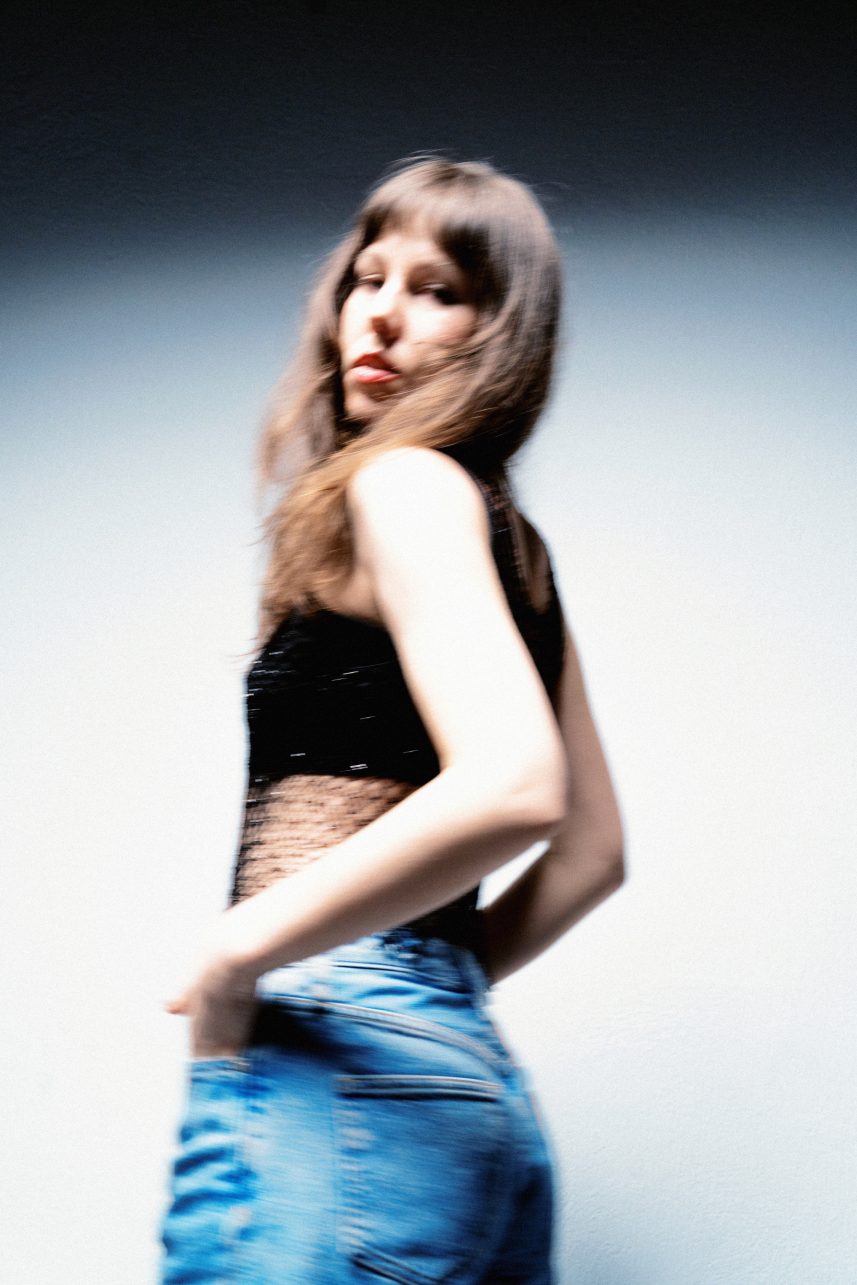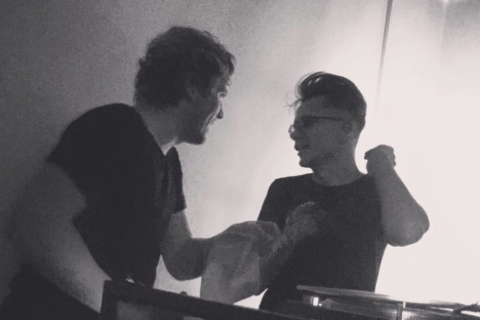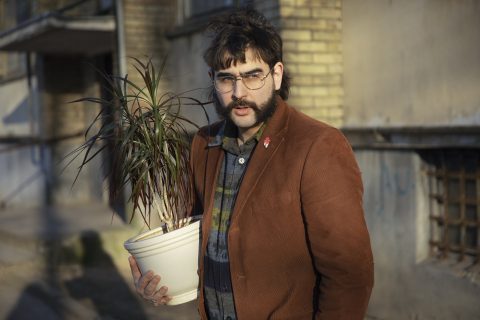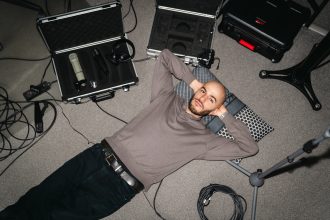“Composer of the younger generation,” that’s how Marija Paškevičiūtė was introduced five years ago. Of course, it is a description that still fits her well today. The winner of the Golden Stage Cross, awarded in 2020 for her music for choreographer Martynas Rimeikis’ ballet Days, Minutes (Lithuanian National Opera and Ballet Theatre), sits in front of me in a stylish café in Kaunas city center, and… can’t make up her mind. “I’m a Libra,” she says, as if apologizing to me and the waiter.
I am definitely in no hurry since I’ve been wanting to get to know the creator, better known in the world of nightlife as Maria Paskevic, famous for her impressive DJ sets, for quite some time now. The names are similar, but you might be interested to check how differently the two sides of the personality, and the scales, are reflected in the results of two Google searches.
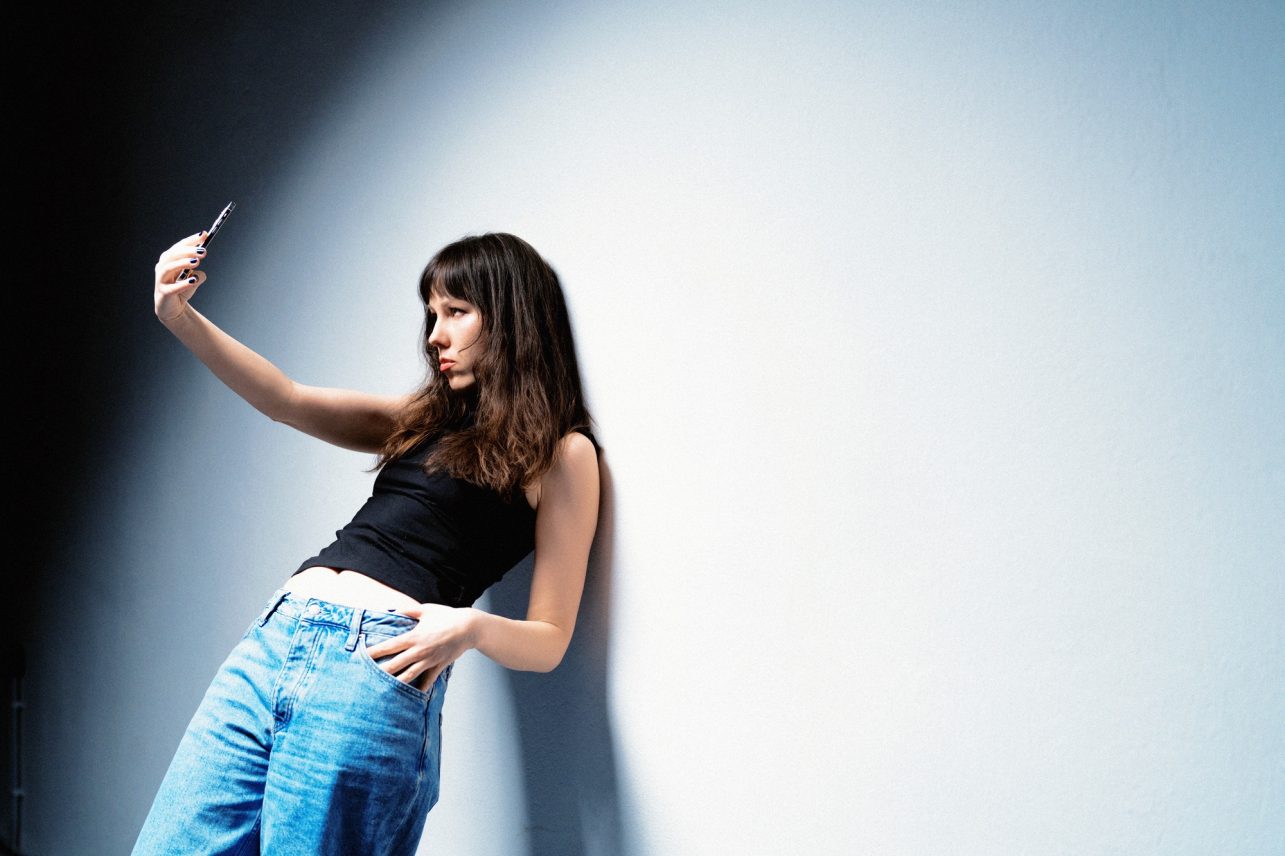
Stockhausen in the communal garden
“Kate Moss was my ideal, I dreamt of becoming a model, but I also wanted to win the Nobel Prize for Literature”, Marija says, showing a photograph from her teenage years, in which she poses wearing sunglasses and jeans that were stylish then and are trendy again today.
A composer who grew up in Šiauliai but isn’t sentimentally attached to the city, openly acknowledges that she owes her solid foundation in music to her mother, a musicologist. Although she played the piano in music school, she ultimately chose a different path – fear of the stage, along with a lack of patience and motivation, held her back. “I didn’t like repeating the same thing over and over,” she admits. Just a reminder – she now creates techno and performs for crowds in clubs.
“I just heard a piece by Stockhausen in music class and I loved it – I’d never heard anything like it. That’s how I started listening to the avant-garde when I was a teenager,” she says. From Karlheinz Stockhausen and Iannis Xenakis to contemporary electronic music, which Marija initially listened to through headphones, not in clubs, no idea of the experiences that lay ahead. I ask her if she really walked around Šiauliai listening to Stockhausen. Yes, and not only in the city but also, for example, in a communal garden. “I remember when I turned the music off while in the garden, I heard all the sounds around me in a completely different way.”
From the Lithuanian Embassy to the ministry of techno
So, about Nobel Prize for Literature. In her teenage years, Marija really did write a lot, not novels but short stories and novellas. She still continues to write: a diary. She also reads. “I wanted to be educated and read everything, but when I was a teenager, I probably didn’t understand anything in these books,” she laughs. Marija has always liked German authors, so she chose to study philology at Vilnius University. And immediately stuns me with a story about her student internship.
She did her internship at the Lithuanian Embassy in Germany, and not just anywhere in Germany, but in Berlin. There, she (almost) immediately visited Berghain, the most important techno club for over a decade, famous for its strict door policy. I say “almost” because the first time, she simply wasn’t let in. But the quick-witted girl quickly figured out how she needed to look for the gates to the night to open. She laughs, remembering how her nightlife stories likely brightened the otherwise dull daily routine of the embassy clerks.
Of course, Marija completed her philology studies and did not bury her diploma deep in the drawer. One of her jobs is translating films. However, she also wanted to continue her studies, so her collection of diplomas includes a master’s degree in composition from the Lithuanian Academy of Music and Theatre. By the way, she started her acquaintance with composition theory as a free listener, while still studying at Vilnius University.
After returning from her internship in Berlin, Marija became a devoted visitor of Vilnius’ club Kablys. “Everyone dances on their own, there are no people who make you feel uncomfortable, and you don’t have to think about your appearance – I felt good here,” Marija recalls the moment when that music, once confined to her headphones, took over her entire world. Today, she is also a resident at Elastica, a sister venue of Kablys. So, if you want to see her behind the decks, head to this club.
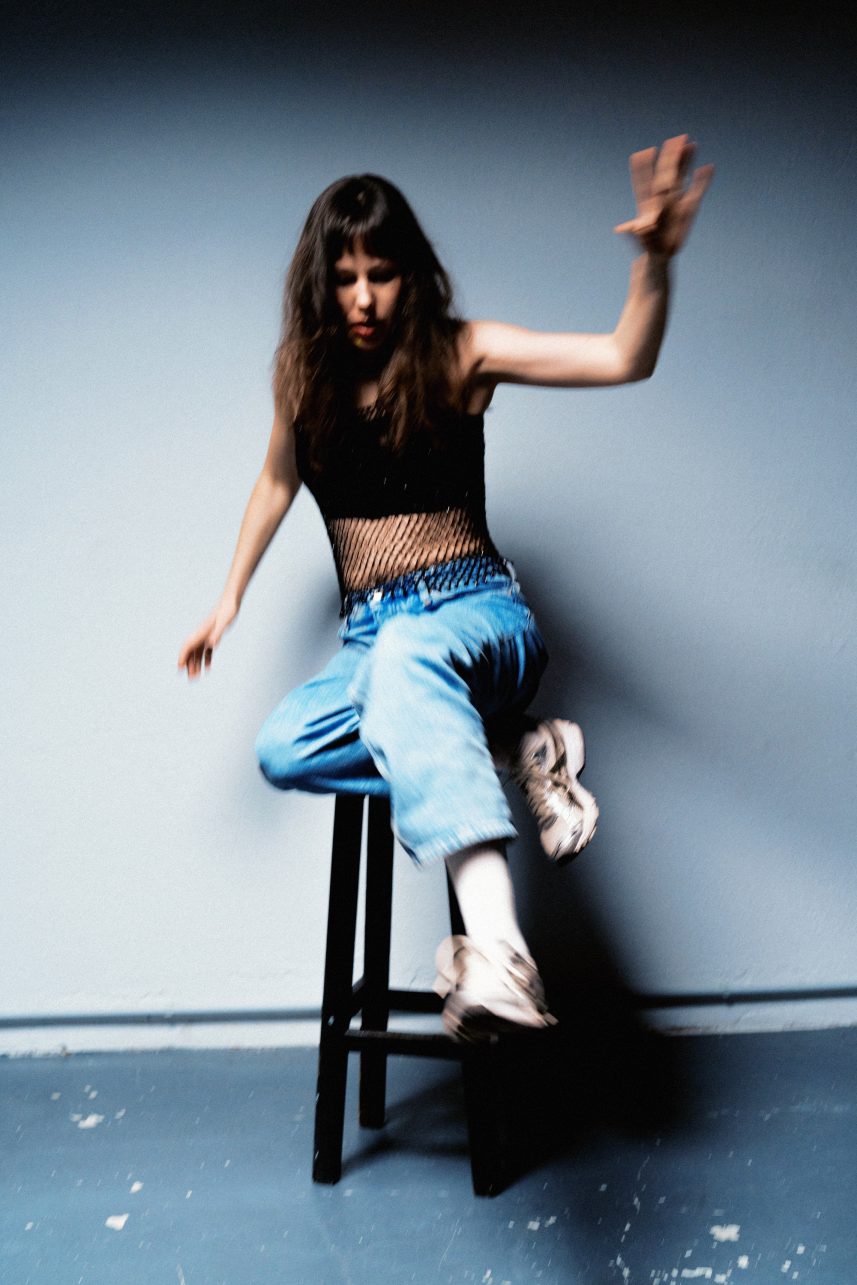
The romanticism of Kaunas
Kaunas also plays a significant role in Marija’s life. She was first invited there by Šarūnas Šimaitis, who previously worked at the club Lizdas and now curates the Audra festival program while constantly scouting for fresh, exciting talents worthy of a loud debut. Thus, in April 2022, the Šiauliai native made her debut at the legendary party series Prisukamas Abrikosas. She had the fortune of playing right after Brutalismus 3000, an international act known for their raw energy, in the Pergalė metal factory – a space packed with dancers eager for massive post-pandemic events and already vibing with the spirit of the European Capital of Culture.
She has spent a long time preparing for this DJ set, analysing the melodies of the tracks, figuring out how they could blend together, and selecting a wide range of genres. “I like to change the dynamics in my DJ sets; I couldn’t play just techno –it’s not in my nature. I prefer to change things up in my sets, and it works,” she explains. Her efforts did not go unnoticed: Kaunas embraced Marija immediately. At Auditorija, a club located in the M. Žilinskas Art Gallery that evolved from Lizdas, she now curates her own event series.
“Maybe it’s because I’ve never really settled in Kaunas that I’m so happy here,” Marija continues when asked to share what it is about the city that keeps drawing her back. She enjoys settling into a freshly prepared hotel room after playing at a club – always the same one. She appreciates the simplicity of traveling light, carrying only what fits in a single backpack. It feels good to wake up refreshed, walk through the weekend atmosphere of Laisvės Avenue, and sit down for a hearty breakfast. Almost like a little vacation.
By the way, earlier this year, we first met at the Ąžuolynas Library, where she had accompanied a friend. While waiting for the interview to finish, she decided to register as a library reader. So now, she’ll be coming to Kaunas not only to perform but also to take out new books.
A composer but not a producer
It’s time to discuss Marija’s own music. “I feel at ease doing this interview because I have four pieces ready to be released later this year – if it wasn’t for the new music, I would probably think we shouldn’t be talking. But I would still like to write for dance, for the stage. I would like to be invited to the theatre to make the kind of music that I make. It wouldn’t be interesting to just do what the director says, I mean, I like theatre, but not that much. I like music more,” Marija says. By the way, her music is already playing on the stage of the National Kaunas Drama Theatre, during the performance for teenagers Taisykla (repair shop).
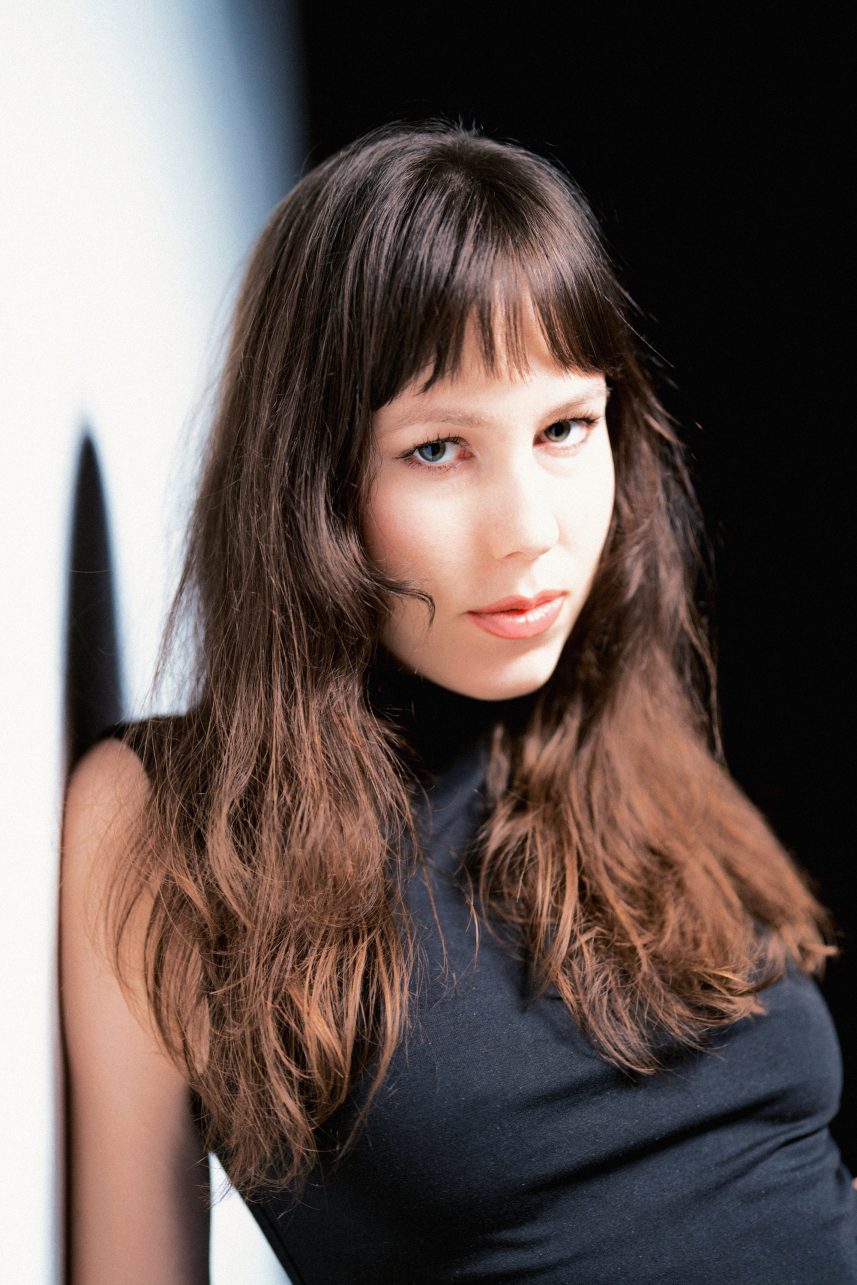
When asked whether winning the Golden Stage Cross at the start of her career helped her, Marija says that after receiving the award, she began getting more invitations to play in clubs: “It worked well for me because I was shy and didn’t know anyone. Breaking into the DJ scene was tough, but my achievements in another field seemed like an interesting added value to event organizers.”
The club electronic music scene is highly democratic – no one demands diplomas or perfect pitch. The interview with Aurimas Šabasevičius published in this magazine illustrates this idea perfectly. However, Marija draws a clear distinction between so-called producers’ music and composition. While the term “producer” is more commonly used in this context, Marija feels it doesn’t quite fit her.
“A producer seems to hammer out a product according to a predetermined template, and that’s it but my process is different. I consider many so-called producers to be composers. And it’s not just the linguist in me speaking. After all, composition is about organizing material, searching for structure and harmony, and I enjoy this phase much more than generating ideas,” she explains. She sees a similarity with the confusion of terms “content creator” and “writer”.
If you go to Marija’s Soundcloud profile and listen, for example, to the astonishingly fast “Best of All Possible Worlds”, her words take on a very concrete, yet heterogeneous and really masterfully structured musical weight. In this and other previous works, Marija’s subtle blend of aggression and dreaminess is a contrast I hope she will not lose. The composer is intrigued that in her new work, we will hear the results of her collaboration with her colleague Migluma.
Dancing offline
It’s no secret to those who follow club culture that it’s going through strange times at the moment – on the one hand, the audience has grown up to want good names from abroad every weekend, interesting scenography and interior solutions, and a safe environment, but… they don’t tend to enjoy it when they come. That is, the audience itself is missing. This is a sign of generational change. Marija, who considers herself a millennial, says that she is already starting to feel the white envy of the younger generation – the so-called “genziukai” know the golden days of club culture only from photos, but want to replicate it. A good example of this is the return of the club aesthetic of the early 2000s. Moreover, perhaps clubs, like theatres and other cultural institutions, will become secure offline oases.
Marija and I both laugh, admitting that we should spend more time offline, engaging in conversations and experiences rather than on Instagram. The next chance to catch up not only with Marija but also with Maria will be on April 11, when she performs at Prisukamas Abrikosas that will transform the second floor of the M. Žilinskas Art Gallery. She won’t be playing alone but alongside her favorite stage partner, Mirrorslave. Come without your phones.
